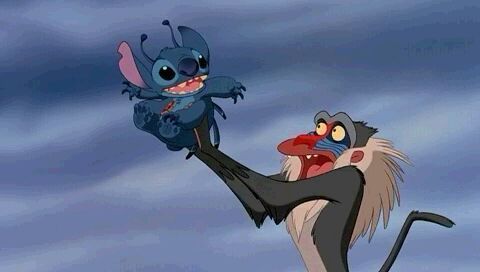#99-- Lilo & Stitch (2002)
Lilo is, to say the least, a difficult child. When she first speaks in the film, we find out that she
is late to her class because she had to feed Pudge, a fish in the ocean, peanut
butter sandwiches and she had to find peanut butter because all they had was
tuna and you COULDN’T feed Pudge tuna because that would be cannibalism. Her logic is impeccable. It just isn’t shared by anyone else in
existence. Yeah, that’s difficult.
But her difficulty is nothing compared to Stitch, a
genetically manipulated creature, formed to destroy whole civilizations by a
mad scientist… excuse me… an evil genius.
Stich can escape from any prison, create mayhem and destroy whole
cities, but he is stuck on Hawaii because the one thing he can’t abide is
water.
 |
| Stitch's part in The Lion King was left on the cutting room floor. |
The question of the movie is can these two social outcast
become a part of a family? The
oft-repeated line of the film is “Oahu means family. In family no one gets left behind or
forgotten.” That’s fine, but can these
two be a part of any family? They think
so differently. They don’t fit any
societal norms, and in fact, they rebel against many of them. Heck, Stitch eats societal norms for
breakfast, and downs a city for a midmorning snack!
The wonderful answer of this film is that they cannot be a
part of an average family. But they can
be family together. The outcasts CAN be
a part of a family—a family of outcasts.
The final act of the film is the creation of a family of the most
awkward band of misfits ever imagined in a single unit.
I love the basic truth of this film: you cannot take misfits
and change them completely to be a part of a standard family. Instead, you must change the image of family
to include misfits. If you can have a functional
family which includes severe dysfunction, then you can have a family of the
homeless, a family of the mentally ill, a family of the traumatized, a family
of the social awkward, a family of those in rehab. Because the conformity of the family matters
little. What really matters is that no
one gets left behind. Or forgotten.

No comments:
Post a Comment